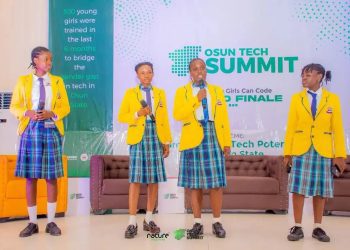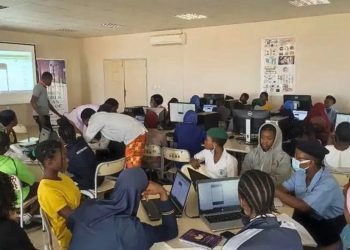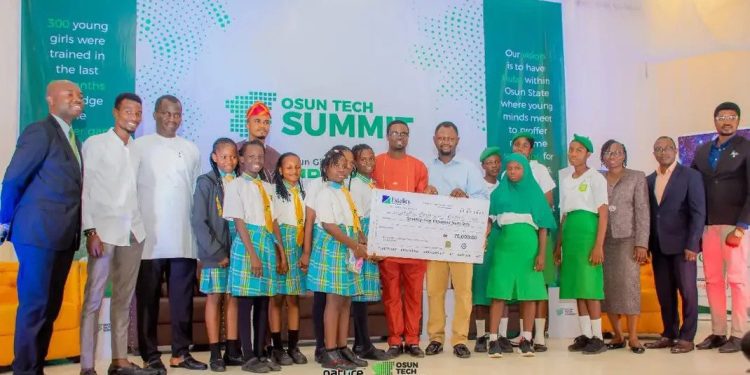Oluwadamilola Zakariyah is a Senior Prefect at Baptist Girls High School, Osogbo. She has always had an interest in technology but was not able to learn the skills hands-on, until 2022 when Matadors Leadership Institute organised a tech inclusion program tagged ‘Osun Girls Can Code’ for secondary school girls in Osun State.
“I had very little exposure to tech before we had the training, the training helped to deepen my knowledge of tech. It exposes us to some kind of tech programmes like app invention, web development, coding, programming and that there is more in tech than just typing and all that.” Oluwadamilola Zakariyah said while narrating her experience during the programme.
In 2021, data by the World Bank showed that more than 50 per cent of Nigeria’s over 200 million population do not have digital skills. The Federal Government, while reacting to this development through the National Information Technology Development Agency (NITDA), said the government hoped to achieve a 95 per cent digital literacy level by 2030. Meanwhile, as the government is taking action to combat digital illiteracy, so are Non-Governmental Organisations (NGOs) taking actions aimed at boosting digital literacy levels among Nigerians.
The Osun Girls Can Code, where participants were trained in coding, app and web development and scratch was organised by an Osun State-based NGO, Matadors Leadership Institute, in partnership with the United States Consulate and the Osun State Ministry of Education. The programme featured the training of 300 female secondary school students and 60 female teachers from 60 secondary schools in the state.
Similarly, a student of Baptist Girls High School, who participated in the program, Inioluwa Oyatoyinbo, said with what she learnt at the Osun Girls Can Code, she would like to be a programmer and software developer, so that she can develop different software that can solve societal problems.
Oyatoyinbo noted that the programme, though, lasted for a week, was comprehensive, as she had practical experience of how to develop apps that can solve social vices. Her team designed a website for anti-sexual abuse advocacy at the end of the project.
The Operating Officer of Matadors Leadership Institute and project manager of Osun Girls Can Code, Precious Olusele-Fred, in a chat with BONews said the initiative was inspired by the need to empower women in the 21st-century future of work.
“Tech is ‘now’ and there have been a lot of activities happening in the tech ecosystem around the world and Osun State is looking somewhat backwards as it relates to technology.
“While we were carrying out our survey, we noticed that ladies were badly affected because an average guy has tech skills,” he said while stressing that the interests of women are usually in other things.
Olusele-Fred noted, however, that as much as those interests are not bad, there is a need to position them for the 21st-century future of works. He noted as well that it will position them for global opportunities.
“You cannot talk about global opportunities or solving global problems without looking at technology; so we said it was extremely key that we pay attention to the marginalised gender in relation to technology. That was what inspired us to carry out the Osun Girls Can Code project,” said Olusele-Fred.
Corroborating the benefit, Sophia Adigun, a senior secondary school III student, who was also part of the training described the training as awesome, but added, however, that she had been unable to practise what she learnt in the course of the programme as a result of lack ICT facilities in her school.
“We had hands-on experience of those things and it was interesting. I have a phone but the phone is not adequate for it. The computer system we have at home is spoilt and has not been repaired,” said Adigun.

Osun Girls can code
Three hundred school girls drawn from 60 secondary schools across the six educational zones – in the state, which were Ede, Ife, Osogbo, Ikirun, Iwo and Ilesa were trained for a week. They were taken through coding, mobile app development, website development, robotics and artificial intelligence.
For each zone, the participants were trained for a period of five days. While the first four days were used for training, the last day was meant for the participants to showcase how technology could be used to solve any identified societal problem. The participants, afterwards, developed and worked on projects that could be used to solve the problems they had identified based on the knowledge acquired from the programme.
Commenting on the ability of the girls to learn about technology, Olusele-Fred said the girls showed resilience and did well as boys could have done.
“It just depends on how you teach them; how you are able to pass knowledge. Knowledge is like raindrops, once it drops any brain can accommodate it.
“It is not gender related. The brain is not gender related. The brain can accommodate anything and of course these ladies really showed that what a man can do, a woman can do too,” he enthusiastically said.
The girls, this official said, really demonstrated during their project presentation, the inherent urge to solve social issues through technology, an opportunity that the Initiative now offered.
“It wasn’t difficult for them, they were fully into it. We were ready to go all the way with them to ensure that the knowledge was passed, and it was brought to that point where technology is seen not just as a mere tool, but the one to solve social problems and that ladies were there to give it the push. There was no gender distinction in it,” he concluded.

Osun Girls are developers
On July 27, 2022, the grand finale of the Osun Girls Can Code was held and it featured the final stage of a tech competition among the participating schools. The 12 finalist schools took turns presenting their projects to the attendees at the programme. Their projects were technology based products produced by the students based on what they learnt in the course of the programme.
Our Lady and St. Francis Catholic College, Osogbo (OSCCO) emerged the overall winner, Oasis Royal Academy Osogbo emerged first runner-up; while Crystalline Montessori School Osogbo and Baptist Girl High School Osogbo tied as second runners-up.
The two schools developed a mental health website, the website that helps to connect people suffering from mental illness to psychiatrists. Oasis Royal Academy developed a mobile application – a learning platform to teach and enable students access to quality education. Crystalline Montessori School developed an application to aid voting and reduce electoral violence and voters’ apathy, while Baptist Girls High School developed a website to combat sexual abuse.
“We are still working and we are open to partnerships to see how we can help these girls to develop these websites to start solving these problems. They started the ideas, they created these but we want to help them expand it and popularise it so people can start visiting these websites and then they become something that people can log in to and see the works of these girls. For now, we are still working to get that done.” Olusele-Fred stated while commenting on the best projects from the competition and their plans for the projects.
The winners together with their projects were introduced to the United States Consul General, Will Stevens, when he came to Osun State in November 2022.
Women in Tech
Generally, it is believed that men are leading the tech space in Nigeria, in fact, there are 16% fewer women than men that use Information Communication Technology in Nigeria. In a chat with Possible Oluronke, a female graphic designer, she said her love for creativity led her into the tech space where she deploys tech to make catchy flyers for adverts.
“I have been in the tech space for over a year now and the percentage of women in tech space within my space is far less than men. It can be said to be around ratio 1:5,” she said, but observes that this is probably so because men have more time on their side than women.
“A self-taught female frontend developer who simply identified herself as Ruqoyyah, said she had been into tech for about nine months. She asserted that her love for programming and its lucrativeness led her to tech. She argued that men had no advantage over women in the tech space.
Akintunde Boluwatife, a social media manager, digital marketer and content writer, who has been in the tech space for four years, said she used to like growing social media pages right from her high school days, and that influenced her to go into it full time when she found out it was an actual profession.
“I learnt it by myself first then later learnt from udemy, udacity and coursera. I feel like every woman thinks tech is coding and coding alone and that’s what makes them see it as something boring or something that they would rather not go into.
“Men like to try new things and the variety of people that study IT in schools go into tech because they have previous experiences from it.” She said while responding to a comment on the advantages men have over women in the tech space. She added that women don’t have any advantage over men in the tech industry.
Teen Stem Club
While commenting on the plans of his organisation for the girls, Olusele said a Science Technology Engineering & Mathematics Club, which is named ‘Osun STEM Club’, had been launched by his organisation and the coordinators, who are staff members of the schools, were trained in January 2023.
The project which is in its pilot phase is currently taking place in 16 schools. However, not only girls will form the club, a small percentage of male students are accommodated too.
Limitations to Digital Literacy in Schools
Oluwadamilola Zakariyyah said she would have loved to be a programmer and app developer, but the lack of Information and Communication Technology facilities in her school is militating against the dream. The lack of these facilities also makes it impossible for the STEM Club to kick off in her school.
“If we can buy these gadgets for them, why not? But currently, we are doing so much, we carry out training, we are still the one taking care of the STEM club and the activities of the clubs, so we can’t afford to get gadgets” Olusele-Fred said when asked to react to the limitation.
He said, as initiator, a report with recommendations had been forwarded to the state Ministry of Education on the issue. Olusele expressed regret that while some schools do not have facilities, some schools have, but locked them away.
This story has been made possible by Nigeria Health Watch with support from the Solutions Journalism Network, a nonprofit organization dedicated to rigorous and compelling reporting about responses to social problems.

